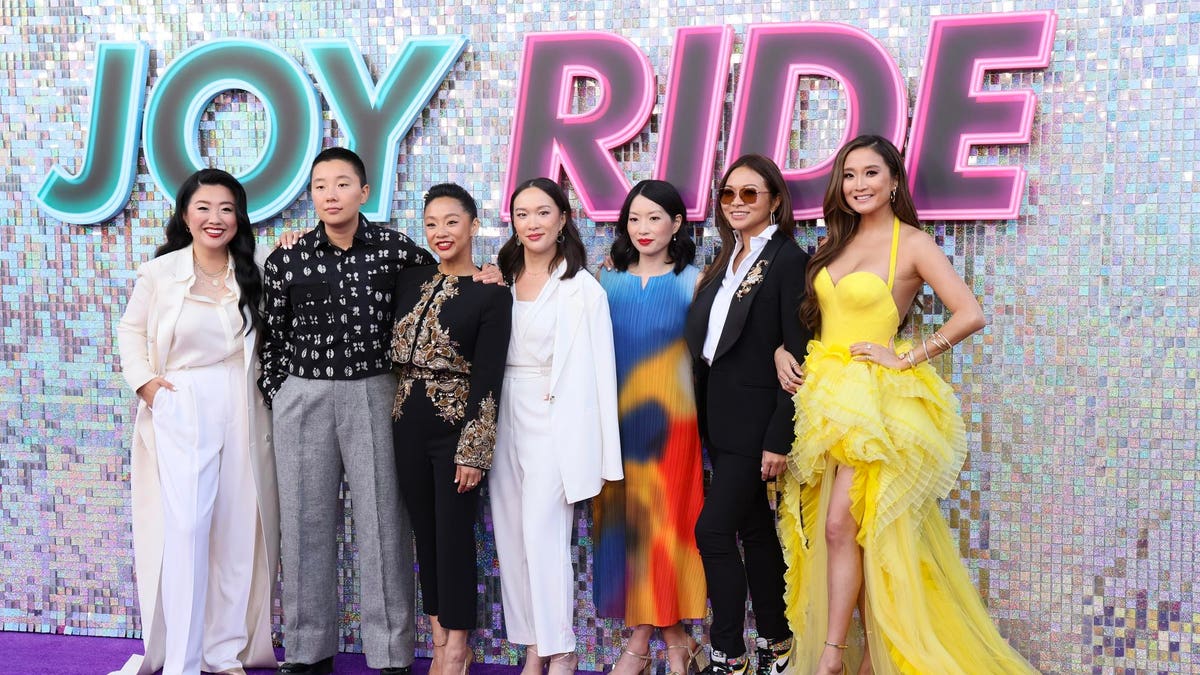Sure, there are several big blockbusters to choose from this summer, but perhaps only one film that is truly pushing boundaries, in more ways than one. Joy Ride, which opens only in theaters on July 7, effectively brings out the raunchy, R-rated laughs while also breaking new ground in Hollywood with its Asian American Pacific Islander-led cast and filmmakers.
Director Adele Lim collaborated alongside writers Cherry Chevapravatdumrong and Teresa Hsiao to bring the story of Joy Ride to life up on the big screen. Starring Ashley Park, Sherry Cola, Sabrina Wu and Stephanie Hsu, Joy Ride centers around a group of Asian American friends who decide to travel together to China, in hopes of finding one of their birth mothers. What starts out as a relatively simple plan quickly escalates into a memorable adventure, filled with many outrageous situations. Yet beyond all of the hilarity is a whole lot of heart and a rather touching, universal story about self-discovery, friendship and embracing all that you are.
Chevapravatdumrong told me, “What if we wrote a movie that we would have loved to have seen growing up? So Teresa, Adele and I basically just started breaking the story while we were just hanging out, having fun. After we broke the story, Teresa and I went off and wrote the script.”
I spoke with Joy Ride’s four stars at CinemaCon in Las Vegas, Nevada, where they received this year’s “Comedy Ensemble of the Year” Award. Chatting with them just hours after Lionsgate screened the film at CinemaCon, I could not help but immediately notice the natural chemistry these four artists have between one another, a pleasant rapport so similar to the playful connection they brought to the screen. I began our conversation by asking them what was the moment when they first realized that they had something special happening with this Joy Ride project.
“The table read, I think,” Hsu said.
Cola agreed, “It was just so surreal being at Point Grey. We were in the parking lot of the Point Grey offices – it was an outdoor table read and just the fact that Point Grey was attached. Lionsgate, this big, incredible machine was attached – like this is such a big deal and I think we felt that.”
Wu added, “We were in a parking lot. The people watching us were socially-distanced masked – in no way should we have gotten laughs. When we were performing, it just felt electric. People were laughing – I stood up on the table because I was feeling it so hard.”
Park said, “I think that the first time I felt like it was special was honestly when I got the script – and this is before Covid. I was like, ‘I want this movie to be made so badly.’ The script was even different then but the fact that Teresa, Cherry and Adele were behind it and that one of the actors in the film brought it to me. We were just so excited to be a part of it.”
Hsiao said of her Joy Ride filmmaking experience with Park, Cola, Wu and Hsu, “Obviously in making a movie, there’s a lot of chaos and a lot of times you’re really dependent on the actors being able to get things really quickly, and they were so quick – so on their feet. I cannot say enough good things about each and every one of them, so for them to be able to kind of run with it and bring so much humanity and comedy at the same time to their characters was incredible to watch.”
Not only is Joy Ride a major victory for the entire Asian community, but it also features several female and non-binary characters in leading roles with such unpolished and unfiltered behavior that has not been seen in such a head-turning way since films like 2011’s Bridesmaids and 2017’s Girls Trip.
Lim said, “As a woman and Chinese-Malaysian immigrant who grew up in a religiously and socially conservative culture, I spent the first half of my life feeling out of place and like I had to co-opt various identities to be accepted. Consciously or not, I brought that experience to my storytelling and directing. Joy Ride is a movie about friendship and belonging, but it’s also about throwing the concept of shame right out of the window. Regardless of what you look like, where you come from, how you identity or who you love – your space is your birthright, and if you can find your people, you will always feel at home.”
I next asked the Joy Ride stars for their thoughts about diversity in Hollywood today, and if they are seeing real progress happening with more inclusive storytelling.
Cola said, “There’s definitely more work to be done always, but I’m just so grateful to be seeing it in real-time and get to be a part of it. We are shifting our narrative, we are reclaiming our identities and like we are just unapologetic and we have this fire to not settle for less ever again!”
During my question, I referenced Hsu’s celebrated performance in this year’s Academy Award Best Picture winner Everything Everywhere All At Once. Being Oscar-nominated for her supporting role as Joy Wang in the A24 film and now co-starring in Joy Ride, Park said of Hsu, “I’m so proud and so excited that she gets to be in this now. All of us are so specific in the film and we love that. We’re so specific in real-life and none of us have to try to fit a mold into what we weren’t.”
Hsu said, “I think one of my favorite things about our film Joy Ride is that it really is just a good time and it’s unhinged and unapologetic, and it’s meant to just be joyous and not take itself too seriously. I feel like above even just diversity and inclusion, we all as a collective deserve and need to just gather and laugh.”
As I concluded my conversation with this filmmaking team, I wondered what they hope moviegoers will feel after seeing Joy Ride up on the big screen this summer.
Cola said, “Liberated, you know? Seen. Heard.”
Hsiao said, “I hope it brings back R-rated comedies in theaters. There is something so special about going to a movie and having everyone in the theater laugh together. It feels like it brings humanity closer together in the sense that you can take a bunch of strangers and everyone can laugh about something and not think about all the sort of terrible things going on in the world. Then later on, be like, ‘You know what? Asian people are funny! We can give them more stories. We want to see more of them on-screen.’”
Read the full article here





